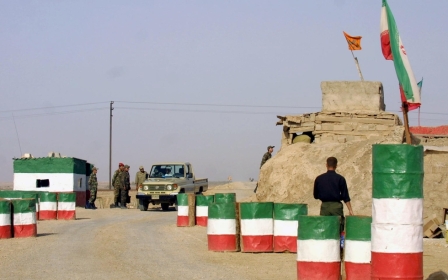Iran bids farewell to late director Kiarostami
Despite not receiving adulation at home during his life, Abbas Kiarostami was lauded 'for trumpeting the name of Iran in cinema and the world'

Mourners carry the coffin of Iranian film-maker Abbas Kiarostami on 10 July 2016 (AFP)
Published date: 10 July 2016 11:10 BST
|
Last update: 7 years 9 months ago
Several thousand cinema lovers joined top artists in Tehran on Sunday to bid farewell to renowned Iranian film director Abbas Kiarostami following his death last week, aged 76, in Paris.
Kiarostami, who won the coveted Palme d'Or at the Cannes Film Festival in 1997 for Taste of Cherry, emerged from the Iranian New Wave of the late 1960s to become one of the world's most revered directors.
"Thank you for paving the tough road of globalisation for Iranian cinema," director Asghar Farhadi, whose A Separation won the country's only Academy Award to date in 2012, told a morning memorial service.
"If there is any enthusiasm or curiosity toward Iranian cinema, it is owed to the steps that you took in those difficult times," Farhadi said.
"Thank you for not abandoning this land despite all the neglect and lack of gratitude," he said.
Kiarostami had been making films outside Iran for years due to restrictions and difficulties working in the Islamic republic.
Despite the global attention given to his films, Kiarostami did not enjoy official support, and his films were rarely shown in Iranian cinemas or on state television.
Some at the memorial service held posters reading "First Welcome, Last Farewell," a reference to the lack of official attention Kiarostami received in his homeland.
In a speech at the memorial service, the head of the Iranian culture ministry's cinema department, Hojatollah Ayubi, thanked Kiarostami "for trumpeting the name of Iran in cinema and the world".
The event was held at Tehran's Centre for the Intellectual Development of Children and Young Adults, where Kiarostami became head of the film department in 1969.
Many of those in attendance lamented the lack of official acknowledgement for the director's work.
"We can't ignore such influential figures," said Ebrahim Ghavamipour, 36. "To ignore Kiarostami is to ignore ourselves."
Helia Pakbaz, a 20-year-old theatre student, said: "We want the world to know how much we value our artists like Kiarostami."
Iranian director Jafar Panahi, an old friend of Kiarostami who is banned from working in the Islamic republic, was present at the service but did not make a statement.
Packed with well-known figures from Iran's art scene, the service was a serene event after calls on social media for those in attendance to act respectfully and avoid taking selfies with celebrities.
Kiarostami's body, which was repatriated to Iran on Friday, was taken to Lavasan, a small town northeast of Tehran, for a private family burial.
Following his death, Kiarostami was praised as a "towering figure" in world cinema for his poetic parables of ordinary lives, known for their modest style, dark realism and sly humour.
Stay informed with MEE's newsletters
Sign up to get the latest alerts, insights and analysis, starting with Turkey Unpacked
Middle East Eye delivers independent and unrivalled coverage and analysis of the Middle East, North Africa and beyond. To learn more about republishing this content and the associated fees, please fill out this form. More about MEE can be found here.




